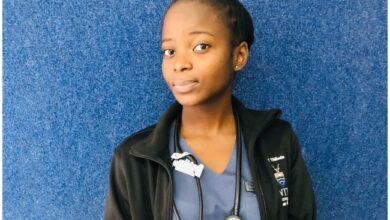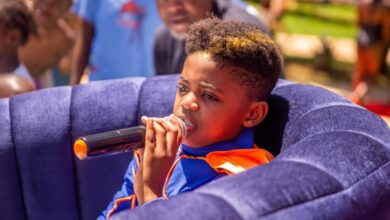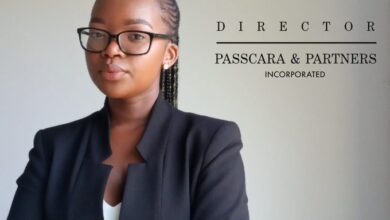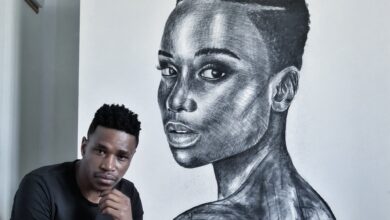Gabriel Obodai Torgbor-Ashong Interview
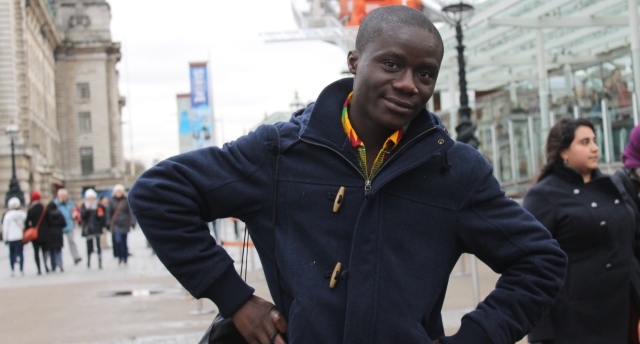
 Please tell us about yourself?
Please tell us about yourself?
My name is Gabriel Obodai Torgbor-Ashong. I am 22 years old and from Ghana. I am a third year student of the Ghana Institute of Journalism studying Bachelor of Arts in Communications. In 2009, my parents died; leaving me with my grandmother and my younger brother who I look after. The death of my parents brought difficult challenges to my life because other family members were not prepared to assist us, and so I had to start working in order to complement the effort of my Grandmother. These challenges did not discourage me but rather urged me on. Through determination, I got admission to the Ghana Institute of Journalism in 2010.
I am now the Google Student Ambassador for my University. I have also been a child and youth rights activist for the past six years with Curious Minds – a youth-led advocacy organisation. I am the co-founder and Executive Chairperson of KetekeGh, a newsletter publication and student advocacy organisation. I have been closely involved with institutions such as UNICEF, UNFPA, ILO, and the then Ministry of Women and Children’s Affairs, contributing to youth-related programmes and policies. I love reading and being in the midst of children.
Please take a minute to know me better:
What is the name of the community outreach project you involved in? And what is it all about?
The name of the Community outreach programme is ‘The Communicators’ Assignment’.
‘The Communicators’ Assignment” is one of three main initiatives by Keteke Ghana, the Organization that I Co-Founded. The other two initiatives which preceded the Community outreach are production of Newsletters and Series of Capacity building Workshops for students.
This project is primarily designed to assist less privileged children in a deprived community with their Education. It also focuses on other aspects of their societal life like water; health and sanitation which will make these children have the best start in life. Our beneficiary village is called Otibilkrom, located in the Central region of Ghana. This village has no electricity, access to potable water, health facility and a tarred road.
In 2012, we (Keteke Ghana) mobilized 63 student volunteers from two Universities in Ghana to teach the pupils in Otibilkrom. We know our contribution, though little will go a long way to help the village. This step we have taken will also, to some extent, assist Ghana to achieve targets under Goal 2 of the Millennium Development Goals. This goal aims at Achieving Universal Basic Education by 2015.
When did it start? What motivated you to start this project?
The Project officially took off on 24th June, 2012 after feasibility studies have been conducted to really know that the village, indeed, needed the form of support we were ready to offer.
A number of reasons motivated us to initiate this project. On my part as a person, I looked at my modest family background and the challenges I have gone through as a young people. With this in mind, I feel it’s prudent to assist other children in any way possible so as for them not to go through the same challenges some of us did.
Collectively, we as journalism students, wanted to cultivate the habit of creating change in deprived communities and making our reportage development oriented instead of the usual Partisan Politicking and News Reportage that flood the media scene in Ghana.
Also, members of Keteke Ghana wanted to practice whatever we learn in class. Though Ghana Institute of Journalism is a leading Communication Institute in Ghana and even Sub-Saharan Africa, the theory aspect of what we study supersedes the practical aspect. As such we felt going on that trip was a means of making what ever we have learnt in class reflect through our video documentaries and articles for print media.
What is the purpose this project?
The Purpose of the project is to bring the plight of the people (children in Otibilkrom) to the fore of the public. This we believe will alert individuals and even the government to step in to assist people in the village and in other similar villages.
We saw many challenges confronting the village: no health facility, no motorable road, no potable water and the only basic school in the village is up to stage three. It is our intention to improve these situations in the village through our own small ways.
What do you want to achieve with project?
We have adopted Otibilkrom and intend serving as mentors for the children and inspire them to aim higher. Our Ultimate aim is to get an external support to build a school block for them. This I know may take something but we have already started fashioning out means to make it happen.
The village does not have access to potable water. During our visit to the village, we realized that some of the little children there were suffering from rashes and other water borne diseases as a result of the water they were drinking. We want to change this situation in Otibilkrom. Our medium term goal, (from 2012-2016) is to drill a bore hole for the village. Already, we are using a video documentary we produced about the village to raise funds in order to drill the borehole. Though we have not received any support yet, we believe our consistent effort will make us have a breakthrough in drilling the borehole sometime soon to come.
Please take a few minutes to watch the video documentary:
http://www.youtube.com/watch?v=YjXs-EdBG_4
http://www.youtube.com/watch?v=3oMIfaVwDQQ
Some of the challenges are beyond us, as students. We recognize the fact that the media is a very tool which can make and unmake. Our aim is to use the media to bring Otibilkrom to the spotlight. We want to draw government and other well meaning Ghanaians’ attention to the situation in Otibilkrom. We believe that will alert them to take a step, especially the government, because it would be compelled to do something in order not to lose votes in our General Elections.
It is also interesting to know that, my friends and I stand to achieve a lot from this community outreach programme. In carrying out this project, we have decided ourselves into working teams. These teams include Teaching & Counselling, TV production Crew, Radio Production Crew, Print Media and Social Media Updaters. In the process of playing these specific roles, we are bettering ourselves in our field of work. This would also position us better for our future work.
How one can get involved in the project?
One can get involved in the project through a number of ways. Some of these include:
- Volunteer to visit and teach children in the village during the summer and support them with any skill and equipment that may be relevant to their work. People in the village are primarily farmers. Their school teachers are not trained (except one), no modern library and Computer laboratory etc.
- Providing or mobilizing teaching and learning materials like story books, Writing pads, Pens etc for the school. Other materials like clothes and farming equipments are equally welcomed.
- Can adopt a child in the village and support the child financially through his or her education.
- Can financially support our borehole project to see it established for the village anytime soon.
- A benevolent Organization can also step in to construct a six-Unit class room block for the village. Because they have just three class rooms and the distant to the other village is so far; the pupils usually drop out of school as a result.
- Just as Mr Bruce Duce has done, a journalist or someone who owns a media firm can feature this village in their media in order to seek support for it and other villages nearby or in other countries as well.
What were some of the challenges you faced as a young person starting your own project?
- When we initially shared the idea with friends, most of them discouraged us. They told us it was a huge project to be undertaken by students. Others said because we were second year students at the time we were inexperienced to embark on such outreach. Whilst this was ongoing, a rival group, composed of students in their fourth year, sprung up and also decided to organize a fun trip. They used the propaganda that we were in our second year and so we were inexperienced and that students shouldn’t support our project. We found this very challenging.
- Combining School academic work with the project as an extra-curriculum activity posed a very great challenge to me. I sometimes had to miss lectures from the initial stages of the project so as to pursue certain stuff for the execution of the project.
- Our effort to seek sponsorship from organizations to support the village on our next visit proved futile. Myself and the other members of Keteke Ghana had to sacrifice our monies to purchase materials for the village and organize the whole trip to execute the project.
How has the journey being like so far?
In fact, so far so good. The organization which brought forth the Community outreach project now has its own newsletter. Though our School is a Communication Institute, It does not have any radio station or a (consistent) Newspaper to enable students practice what they learn in Class. Our Newsletter, therefore, set in to bridge the communication gap in the Institute.
In November 2012, partly because of my project, the British Council selected me as one of 60 young people, out of over 3000 applicants to attend its Global Changemakers Global Youth Summit In London. Trust me, it was one of the best moments in my life. I got inspired by what those brilliant young people were also doing and that gingered me up to also do more.
When I returned to Ghana after the Summit, My colleagues and I successfully organized 2nd Year Anniversary to celebrate the birth of our student organization and launched the video documentary we produced from our Community Outreach Programme. This happened on 15th February, 2013. This caught the attention of the 2012 Best Ghanaian Journalist, Mr Manasseh Azure Awuni, who has pledged to support us in any capacity he could to advance our project.
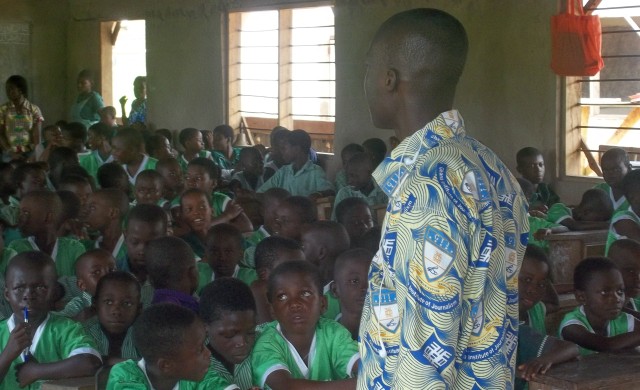 How has the community benefited from the project?
How has the community benefited from the project?
- The basic school in the village, two weeks after our visit, received an accreditation from the Ghana Education Service. This new status for the school has made it possible for a trained teacher to be posted there. Though this is not enough, it makes the school eligible to receive further support from the government.
- Before we visited the village, we mobilized resources from fellow students and used that to stock the school’s library with teaching and learning materials. We also managed to paint their three class-room block to give it a new look.
- Five ladies were trained in how to craft door mats and necklaces. These we believe will help them earn a living if they improve that skill and use it for business.
- The elders and people of Otibilkrom, through our durbar, got further enlightenment on significance of educating their children, and also on adolescent sexual and reproductive rights
What has been some of your biggest achievements yet?
- In June 2012, Google selected me as one of their Sub-Saharan African Student Ambassadors for my University. With the support of Google, over 500 student journalists have been trained on effective online journalism. Through a major Mapping Event, my University has been mapped and can be located on Google Maps. At the moment, I am liaising between Google and my University to have Google Support us with internet.
- I also consider my selection to be a Global Changemaker as a very great achievement. I have learned new skills and networked with other young people. Most importantly, other young people in my community and on campus are encouraged to also do their best in their respect activities as a result.
- At the moment, I am the elected General Secretary of my University’s Students’ Representative Council (SRC). The SRC is the highest student authority on campus which seeks the interest of their fellow students at the University’s Governing Council level and through other student-related initiatives.
- Children and Youth in Broadcasting-Curious Minds awarded me the best 2008 New Personality of the year during their Awards Ceremony. Curious Minds is a Global Award Winning Youth Advocacy Organization.
- I was one of two Ghanaian Youth Representatives at the International Conference on AIDS and STIs in Africa. This Conference brought together high profiled individuals like Former President George Bush, Late President of Ethiopia Meles Zenawi, ministers, heads of UN agencies and young people to access progress being made in the treatment and possible combat of HIV and AIDS in Africa. It was held in Addis Ababa, Ethiopia in December, 2011.
- I was a member of a group tasked by the then Ghanaian Ministry of Women and Children’s Affairs to review the Simplified version of Ghana’s Human Trafficking Act(674) and also developed a child-friendly version of Ghana’s Domestic Violence Act (732).
What do you think are some of the challenges facing African youth today?
I see the Educational System in some African countries as a real challenge for the development of Young People. In Most Universities and Polytechnics in Africa, Curriculum is mainly theory-based and not practical in nature. There are limited equipments and facilities to make students practice what they learn in class. In Ghana for instance, we have a Graduate unemployed Association. Why should students spend money and years in school and come out unemployed? These young people are usually Job seekers and not Job creators. The Uprising we witnessed a few years back in Northern Africa was partly as a result of Unemployment.
By now Africa should also be having its own ‘Mark Zuckabergs’.
Where do you see yourself in 5 years time?
In three years time I want to be a graduate of the Ghana Law School or any other reputable law school across the world. Thereafter, I will use my legal background to practice Journalism as my professional carrier. I also want to see myself as a well established entrepreneur in the next five years. By that time, the Organization that I lead (Keteke Ghana), should have been extended to and consolidated on the various University Campuses in Ghana.
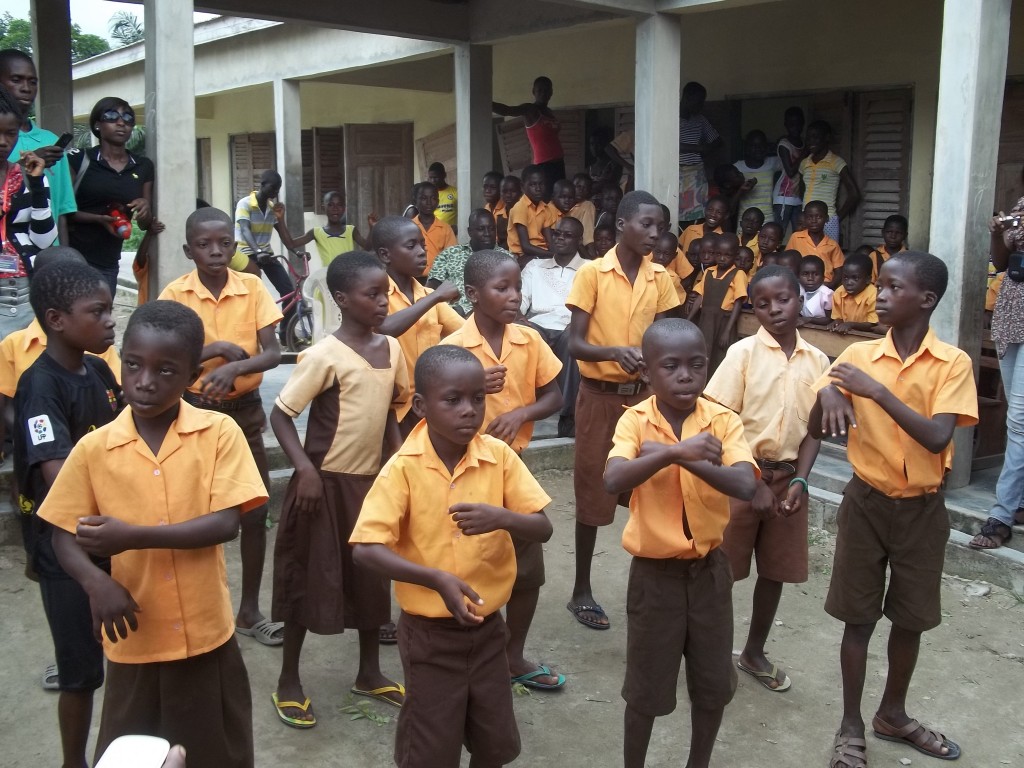 What would you like to change about Africa today?
What would you like to change about Africa today?
Leadership!!! I feel Africa has not yet reached the pedestal it truly deserves because of poor/average leadership in both the academia and Political realm. Some African Countries are still experiencing Coup D’état and political instability. We cannot develop this way. Many media practitioners take delight in focussing too much on Politics than the basic developmental needs of our society. I wish this could also change.
We have many African Professors, Doctors and PhD holders in Africa and beyond. In my opinion, the continent is yet to see the worth of knowledge they’ve acquired over the years manifest and reflect into something tangible for the development of the African people. A few of them have done well, but the rest, which are in the majority, can do better.
Student Leadership in most African Countries seem to be a reflection of what happens at the National Level: corruption, misunderstandings and other related stuff. If we, as student leaders, inculcate good habits today, Africa will certainly have a reason to smile tomorrow.
What advice do you have for young people who want to start their own project?
Consult and seek advice from trusted individuals on how to start and sustain the project. Pursue only projects that you are passionate about. One of our African adages says that ‘Two heads are better than one’. So I advise that you invite a few friends who you know will be committed to the project to assist you.
If you do not start something on your own today, especially when you have the chance, you may get disappointed or regret in some years to come.
I do not won’t to be lost when my generation die off. Kwame Nkrumah, Nelson Mandela, Jomo Kenyata, Haile Sellase and others stood out in their generation through the impact they created in their own small way to their society. I also want to leave a mark. What about you?
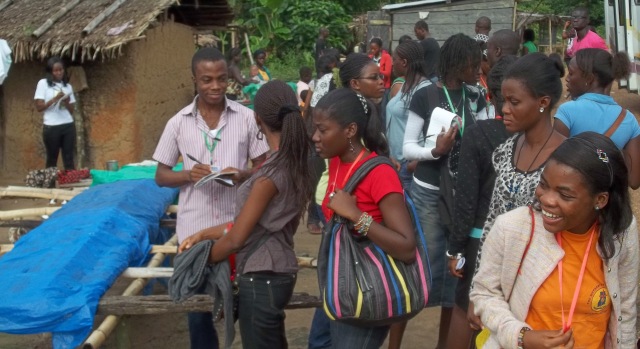 How can other youth connect with you?
How can other youth connect with you?
My Profile name on Google+ and Facebook is Gabriel Obodai Torgbor-Ashong.
Email Address: [email protected]
Twitter handle: @gabrielashong
Blog: gabrielashong.blogspot.com
Ketekeonline.blogspot.com

